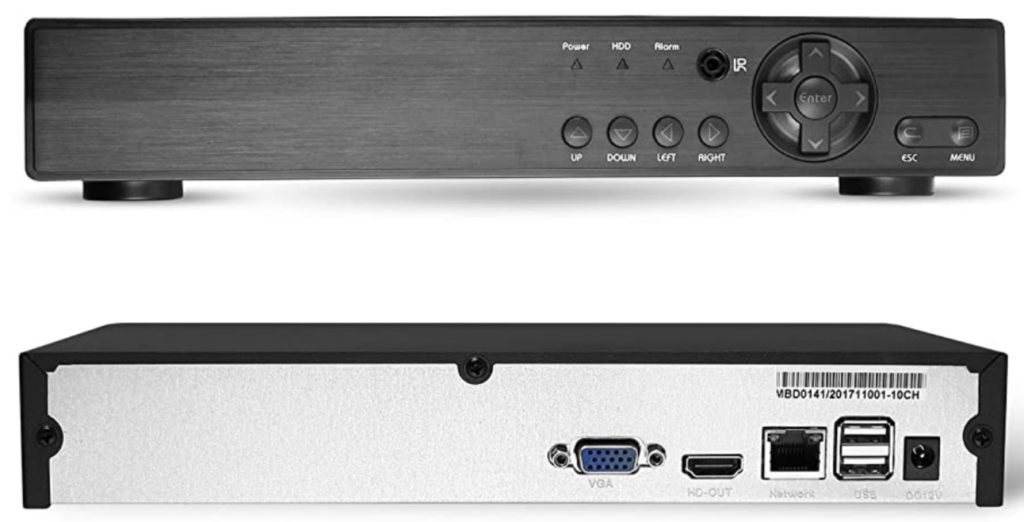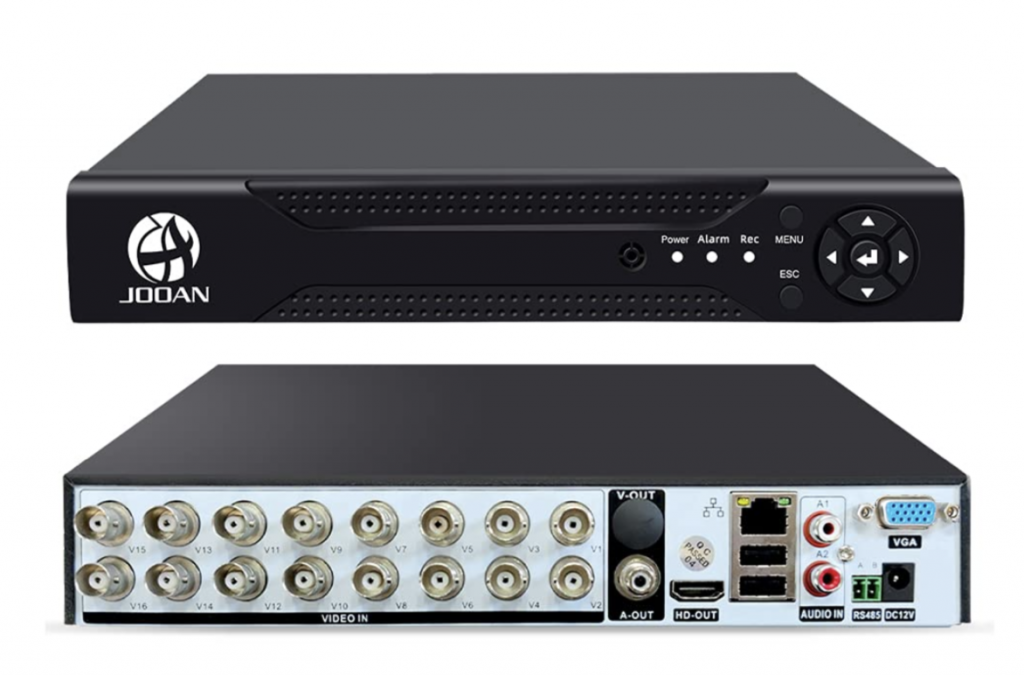If you’ve ever considered installing security cameras at home or elsewhere, you might have come across the terms NVR and DVR. That’s because both are essential to the effective functioning of security systems.
In a word, network video recorders (NVR) and digital video recorders (DVR) are the most common types of video recorder used to store the data captured by security cameras. You can then view and edit footage using the system.
But with increasingly more accessible options for security cameras, including mobile apps and IP cameras that support cloud storage, will their relevance remain? Not to mention, which one should you get?
Understanding The Difference Between DVR vs NVR Systems
Summary of Key Features
| DVR | NVR |
| Analog (traditional CCTV) | Internet Protocol (function via the internet) |
| Wired | Wireless/Wired |
| Data transmission via coaxial cable | Data transmission through Wi-Fi or Ethernet cable |
| Multiple channels (8+ cameras) | Multiple channels (8+ cameras) |
| Raw footage processed and encoded by the DVR | Footage compressed, processed, and encoded by the camera itself |
What is NVR?
An NVR recorder is attached to a network, and includes a software program to facilitate this. Hence, it’s generally used with IP (Internet Protocol) cameras rather than traditional analog ones, because it allows footage to be saved to a digital format, whether that’s a disk drive, SD card, or something else.
Since they work with IP cameras, NVRs use wireless technologies like wifi to function. They often also feature ethernet ports, allowing for faster uploads in higher quality.
What is DVR?
A DVR, on the other hand, typically works with analog cameras, despite its name implying otherwise. DVR CCTV is what’s typically been used in business and public settings. The camera streams an analog signal to the DVR through a coaxial cable, making it a completely wired connection. The DVR then processes the footage.

What is HVR?
A third alternative, an HVR (hybrid video recorder), combines the two, allowing you to record images from both traditional analog and IP cameras. Even if you’ve seen the terms ‘NVR’ and ‘DVR’ thrown around, chances are, you might be unfamiliar with HVRs.
That’s likely because many so-called DVRs do in fact support functionality from analog and IP cameras, but are marketed as ‘hybrid DVRs’. As such, if searching specifically for a recorder that supports both analog and digital, it may be wiser to use that term (even if it is technically incorrect).
Essentially, DVR, NVR, and HVR systems all perform the same function: they record footage onto a hard drive. So, what’s better? Let’s consider some of the pros and cons.
The Pros and Cons of DVR and NVR
We’ve identified four key areas for comparison to help establish the pros and cons of both DVR and NVR systems: cables, cost, reliability, and quality of footage.
DVR
| Pros | Cons |
| Data transferred through coaxial cables is raw, so footage is high quality. | Coaxial cables (which natively don’t transfer audio) are thick and stiff, making them unsightly and inconvenient to hide. |
| DVR processes and encodes data, but costs less than NVR, which doesn’t. | More expensive than a modern standalone IP camera. |
| Signal is highly stable. | Power outages will result in lost footage. |
| Hacking is virtually impossible. | No back-up power source or cloud storage. |
NVR
| Pros | Cons |
| Ethernet cables are thin and malleable, making them easier to move around and conceal. | When using Wi-Fi, more susceptible to hacking. |
| Ethernet creates a more stable connection than wireless Wi-Fi. | Expensive compared with both DVR and standalone IP cameras. |
| Footage can potentially be streamed and saved to the cloud. | Power outages and internet outages will result in lost footage. |
| Hacking is harder to conduct through a wired internet connection than a wireless one. | Constant upload of raw footage will be taxing on Internet speeds. |
Cables
One of the major pulls of IP cameras in general is that they support wireless uploading of footage through wifi, mobile data, or Bluetooth. This makes them a popular (and less expensive) option for homeowners and renters alike, who, above all else, need convenience and ease of access to footage. An NVR recorder allows for this, as well as ethernet cable connection.
Ethernet cables are thinner and more malleable compared to the coaxial cables used to connect analog cameras to DVRs, which are not only much thicker and stiffer, but don’t provide power to the device.
This makes them somewhat more annoying to install (coaxial cables aren’t exactly discreet). They also don’t provide audio natively, so an additional connection or non-standard coaxial cable would be needed to do this.
Cost
Though there isn’t necessarily any fixed difference between DVR and NVR in terms of price, NVR prices tend to be higher simply because DVRs are for older analog cameras.
That being said, a DVR technically does more than an NVR: DVRs process and encode video data, whereas an NVR does not (this is done by the camera itself).

In terms of price, both an NVR and DVR are an investment which may not be entirely necessary for average homeowners and renters looking for simple security improvements.
If looking for simple and inexpensive ways to improve your security, check out our article on DIY home security hacks.
Reliability
In terms of the reliability of the system, there are a few factors to consider.
For an NVR, this would include things like the stability of your existing wifi, bandwidth usage, and so forth. If the space allows for it, an ethernet cable is a far more reliable way to stay connected to the internet, making loss of footage due to dropouts or interference from other wireless devices less likely.
Still, the constant upload of high quality 24/7 footage via the internet is, of course, very taxing on your upload speeds, especially if the internet is already being used for downloads and uploads by other people.
Perhaps the longevity of the DVR system is down to its reliableness, then. Even though it’s harder to install, bandwidth usage (if any) is minimal, the signal is far more stable, and interference, whether that’s through hacking or dropouts, is virtually impossible.
Of course, neither NVRs or DVRs can escape the consequences of a power outage, risking the loss of footage where a mobile device or IP camera that uploads to the cloud would be able to avoid it.
Quality of footage
IP cameras even at the lower end of the market now often support upwards of 1080p capture, but since they are reliant on the internet, the reality of this is that the footage tends to be significantly degraded by the time it’s on your hard-drive. In fact, don’t expect Oscar award-winning cinematography from either IP cameras or analog CCTV.
The image quality able to be processed by a DVR is invariably worse than that of a modern NVR. Still, where an NVR-IP camera combo may be prone to significant degradation at random points during filming, a DVR-CCTV combo will be remarkably consistent in the quality of footage it captures.
What Do I Need – NVR or DVR?
So what should you get: NVR, DVR, HVR, or none?
Scrutinizing the extent of your security needs can help determine which system is best for you, or whether you need one at all.
DVRs have been a mainstay of businesses and public spaces for years, which likely reflects their reliability. Audio isn’t exactly necessary for public CCTV, and hiding cables won’t be a problem either, since professional installation will likely be used. Read more on security cameras for business, big and small.
But for homes, CCTV is a rather impractical choice that is both inconvenient and unaesthetic. IP cameras are small and mobile, and often allow for push notifications, alerts, and other flexible features thanks to the internet, making them more adept for home security.
In fact, for those looking to implement fast, easy security measures, you may consider foregoing hardware altogether. Most IP cameras on the market can function perfectly fine with a PC or smart device, uploading footage to the cloud or elsewhere.
AlfredCamera also gives you the option to turn an old device into a de facto security camera, replete with features like motion detection, real time alerts, and low-light functionality. This is a great option if your requirements are relatively casual, like for baby and pet monitoring.
AlfredCamera is available for free on the App Store and Google Play Store.
FAQ
How long does NVR last?
The lifespan of an NVR will vary product-to-product. Since the tech is still so young, there is supposedly little data on the lifespan of IP cameras, but the camera should last twice as long as the NVR system.
What are the disadvantages of NVR?
Disadvantages of NVR include loss of footage caused by signal dropout, potentially unreliable quality of footage, and the cost of the system over a DVR.
Can NVR work without the Internet?
IP cameras don’t necessarily require the internet at all times, but for all intents and purposes, they are designed to function through it, so features like alerts won’t work. Some IP cameras and NVRs can still communicate through their own proprietary internet connections if the wifi is down.
PoE (power over ethernet) cables, which also allow the camera to be powered, can also connect them, but these would need to be constantly connected. A lot of IP cameras will feature SD card ports anyway, so if for whatever reason it cannot connect to the NVR, chances are you can still record footage via an SD card.
Find out more about how you can set up a reliable security camera system without the internet.
How much does NVR cost?
An 8 channel NVR can cost anywhere from around a hundred dollars to over a thousand. Price depends on its features, whether it comes with cameras, how many it has, and so forth.
Does NVR need to be connected to router?
An NVR needs to be connected to a LAN-connected device; for most people, that will be a router. Find out more about routers for security cameras.
Do I need NVR for IP camera?
DVR will not function with IP cameras, unless it has hybrid functionality, in which case it is referred to as HVR, but not all IP cameras necessarily require NVR to function. Here is a list of IP cams that don’t require a NVR.
Conclusion
Choosing between security camera recording systems might not be so simple as NVR vs DVR. Both have their advantages and disadvantages, and it ultimately depends on whether you’ll be using IP cameras or analog CCTV (which in turn depends largely on the nature of the space you’ll be monitoring).
While NVR allows for greater flexibility and ease of installation, DVR has proven itself for decades as a reliable way to encode footage, and is favored in numerous business settings. There’s also the possibility of opting for neither by instead using an IP camera or mobile app, like AlfredCamera that doesn’t require further hardware to save the footage.
With so many major manufacturers now creating affordable, feature-rich home security products, including Google and Amazon, that completely bypass the need for any kind of storage or processing hardware, it will be interesting to see whether NVR and DVR will remain as ubiquitous as they have been in the coming years.
Recommended reading:
The Best Wired Security Camera Systems of 2022
A Crash Course in Motion Sensor Cameras
Types of Security Cameras: The Essential Guide
